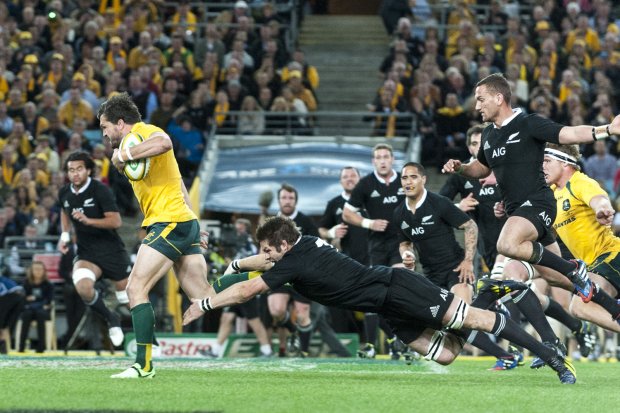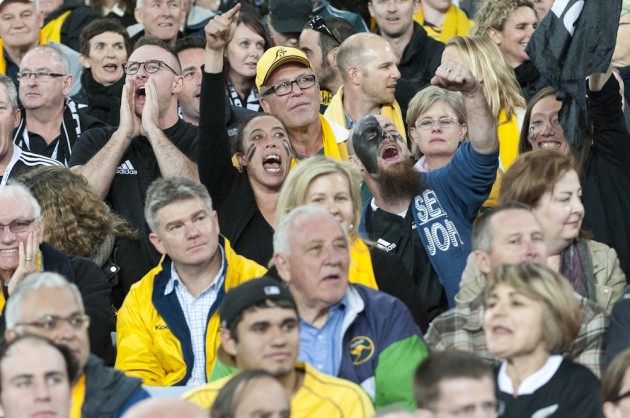So who feels bummed out about the Wallabies’ performance on the weekend? I know I do. Leading into the game, there was a lot of anticipation about the Ewen era. Link had taken the reins from Robbie Deans, and was going to whip Aussie rugby back into shape – starting with the All Blacks.
Unfortunately for Australian rugby fans, quite the opposite happened. The Wallabies struggled to get front foot ball, the backrow was rendered ineffective, realignment was too slow, there were no support lines and a lack of options, partly because there were no bodies in motion. But the telling aspect was a lack of patience. Too often, the Wallabies attempted to force the play, rather than playing with patience and trusting their systems.
Watching the game live, it was obvious the Wallabies were attempting to play an up-tempo game. The problem is, they lacked the patience to dictate the terms of the game. In the first minute, Jesse Mogg took a brilliant high ball, only to push a dodgy pass to Stephen Moore in Contact:
Later on in the first half, Adam Ashley Cooper made a fantastic break off a set piece play:
Once he got behind the defensive line, he started running out of options. On this occasion he did the right thing and took the ball to ground. However, Will Genia then chose the wrong option. Genia kicked the ball through, with James Horwill as the chaser. In this circumstance Genia would have been better served passing the ball to Horwill.
These options are taken in the heat of the moment. Capitalising on an opportunity does not mean taking the first option though. Patient sides will work an opponent over, bide their time and stick to what they do well. In the case of the All Blacks, they simply pressured the Wallabies ruck, and forced the Wallabies into an area where they didn’t seem comfortable; the All Blacks dictated the play, the Wallabies attempted to push it. In doing so, they played right into the hands of the men in black.
For the Australian rugby public, the final scoreline was the ultimate anti-climax to the new era.
The Australian rugby public places high expectations on the national side. Granted, we don’t place as much expectation as the NZ public do on the All Blacks, but we do expect our boys to take it to the men in black, to push them all the way. What we don’t want is to be dominated, over and over again.

In recent years the Wallabies haven’t really taken up the ‘All Black Challenge’. So the public can be forgiven for thinking that the new coach was going to turn everything around in a few weeks. However, I can’t help thinking that us punters have fallen into the same trap the Wallabies did on Saturday night. We have been impatient. We wanted our boys to come out and show the All Blacks that Aussie rugby was somehow ‘back’.
While I have no doubt that the Wallabies will get better, we have to be prepared that it could take a bit of time. Think of the Pantene commercials: ‘it won’t happen overnight, but it will happen’. In the meantime, we need to show some patience.
Patience is a funny thing though. You want the Wallabies to win. You want the Wallabies to become instant world beaters with the change of a flyhalf, or a coach, or a backrower. You don’t want to wait for these things to happen; you want them now!
The rugby gods are fickle though. When Rod Macqueen took charge of the Wallabies in September 1997, the side was at a low ebb. They had just been thrashed by South Africa 61-22. The Wallabies had also failed to win a game against New Zealand that year.
Macqueen had from September to November to prepare the Wallabies for their four game end of year tour of Argentina, England and Scotland. That tour only yielded two victories. Macqueen won his first outing as Wallabies coach against Argentina, but lost the next match to them. A draw with England, who Australia had beaten 25-6 earlier in the year, and a win against Scotland followed.
Why is this relevant? Because it took Rod Macqueen a good season to settle into the job. Had Rod Macqueen taken charge of the Wallabies before the Tri-Nations in 1997, chances are the results would have been the same. Looking back even further, even Green and Gold Rugby’s own Bob Dwyer needed time. After taking over the coaching role for the second time in 1988, Bob was the coach during the 1989 series loss to the British and Irish Lions. However, two years later Bob would coach the Wallabies to a World Cup victory.
The Australian rugby public have been waiting for over ten years for the boys in gold to bring the Bledisloe home though! So many would argue that their patience is wearing thin. And fair enough too, but we have to understand that the Wallabies have played one game under the new coach. Let that sink in for a second. One. Game.
For me, the slate was wiped clean when the new coaching regime took over. If we can show some patience, and the Wallabies can show constant improvement, then I think the Wallabies are going to end up in a better place. This is going to take time though. How much time you ask? That is an open question at this stage.
The Wallabies now have one week to prepare for the second instalment of the ‘All Black Challenge’. I want the Wallabies to win, I want them to take it to any and every team they play. But try not to get too upset if they lose. Instead, contrast one game with the other, and track the improvement. If the Wallabies win, well then, that improvement is easily tracked!
The bottom line is – let’s be patient. Let this team figure out their new identity. But don’t give up hope. Never give up hope.
*Match photos courtesy of Tim Anger Photography





